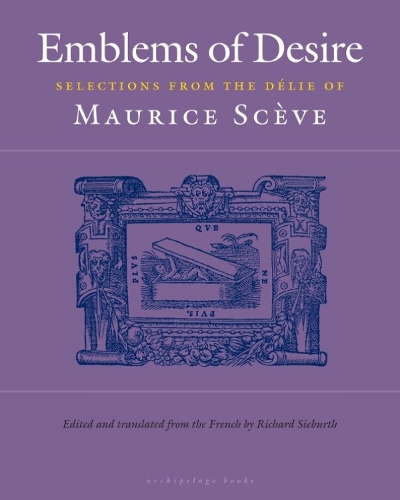
Emblems Of Desire: Selections from the Delie of Maurice Sceve
(Paperback)
Publishing Details
Emblems Of Desire: Selections from the Delie of Maurice Sceve
By (Author) Richard Sieburth
By (author) Maurice Sceve
Archipelago Books
Archipelago Books
15th December 2014
United States
Classifications
General
Non Fiction
841.3
Physical Properties
Paperback
224
Width 153mm, Height 190mm
297g
Description
'Sieburth has found a contemporary equivalent for Sc ve's extremely compact music and enabled it to breathe in English, while still retaining the tension of the original.' -John Ashbery
Reviews
Richard Sieburth has performed a magnificent service by translating a large selection of the book-length love poem 'Dlie' by Maurice Scve, one of the greatest French Renaissance poets, whose work is hardly known in English. He has found a contemporary equivalent for Scve's extremely compact music and enabled it to breathe in English, while still retaining the tension of the original. John Ashbery
Richard Sieburth has performed a miracle of literary invention. He has made these poems sing. Paul Auster
The most intense and tightly controlled verse written in the French Renaissance. Jerry C. Nash, author of Love Aesthetics of Maurice Scve
The translations are tours de force, rendering Scve's concentrated phrases into accessible, often charming English verse. Margaret M. McGowan, Times Literary Supplement
A true credit to both an exacting and inventive work, Sieburths translations remain the highlight of this handsome collection of scorned love, an impressive English introduction to the 'Dlie'. Rain Taxi
Recovered, rediscovered early in the twentieth century, the radically inventive and challenging poetry of Maurice Scve forms an important link in the history of European lyric from the Renaissance to the present. Its complexly erotic silences and harmonies speak as vividly to our own deeply unsettled moment as they must have to that vital circle of poets and humanists of Lyons, who were among the first in France to explore the Petrarchan field of desire. What a great gift, to receive these virtuosic renditions in English from one of our finest living scholars and translators, Richard Sieburth. Michael Palmer
It is rare to see a book so perfectly equipped to both befriend the non-specialist reader and aid the scholar. If Scve's work is finally to enter the mainstream, this is the book that will make it possible. Jennifer Grotz, Boston Review
An exquisite version, a marvelous contribution. Harold Bloom
Author Bio
Maurice Sc ve(c.1500-c.1564) was at the center of Lyonnese c terie that elaborated the theory of spiritual love.
